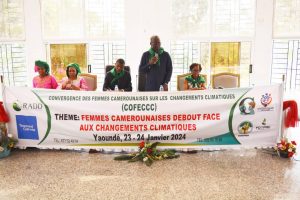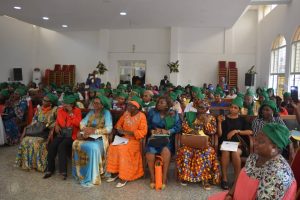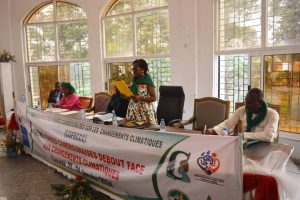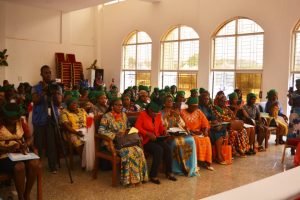
Story, Louvier Kindo Tombe
Cameroonian women are becoming more and more committed in issues related to climate change, but most often their voices are not heard or they are not always given the opportunity to prove their wealth. It is within this backdrop that a group of Cameroonian women whose main focus is combatting climate change effects decided to come together and brainstorm on the way forward. The group is better known by its french accronym ‘COFECCC’.
For two day, the women, over 250 coming from the ten regions of the country identified challenges they face in fighting climate change. They equally seized the occasion to come up with recommendations addressed to the government, civil society organizations, policy makers, private sector, international community just to name but these, with the objective of mitigating climate change effects.

The women acknowledged the fact that they are the most hit by the effects of climate change owing to their status (financial, economic, gender and otherwise) in the society irrespective of their background. They however believe that it is imperative to revisit the approach in addressing climate change and the time to do so they say, is now.
Women at forefront of climate change

The women of COFECCC during their forum in Yaounde at the hall of the Yaounde I council discovered that Cameroonian women are more active in the fight against climate change, and their motivation could be boosted if the right thing is done like putting them at the center of policies, decisions, actions among others.
Besides continues sensitization to encourage more women to embrace the fight and be present in most decision taking instances, COFECCC wants gender to be respected in the national strategy for sustainable development and adaptation in climate change. The group also want that sustainable climate change actions in the agricultural, and energy sectors should be adopted.
Most women-led climate change projects are often not given the consideration they deserve, that is why COFECCC employs the powers that be, to canvas for finances to fund women-led climate change projects in the country, and also ease access to fundings for women.
Networking is also a very important aspect in the fight against climate change, and one of the recommendations was for the reinforcement of coordination and collaboration between committed women with focus on training and capacity building.

The women sent a clarion call to the government, policy makers, civil society groups, international community and other stakeholders in the sector to see into it that the recommendations are taken into consideration and implemented, and that countries promoting climate change, should reduce their emmisions and respect decisions arrived at during the different Conference of Parties (COP) meetings.








